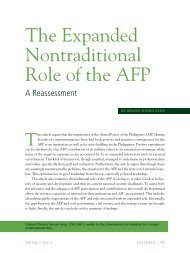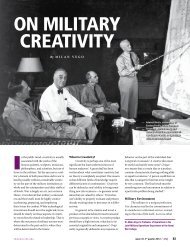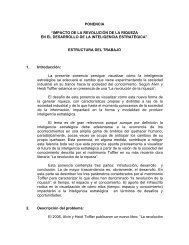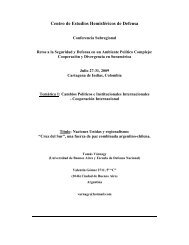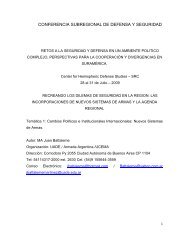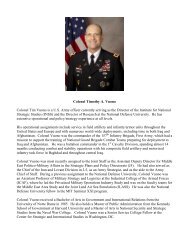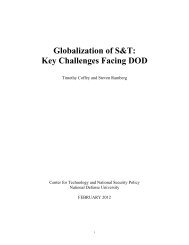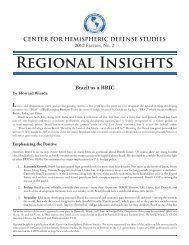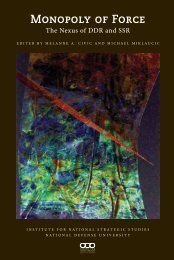On the Nature of Military Theory - National Defense University
On the Nature of Military Theory - National Defense University
On the Nature of Military Theory - National Defense University
Create successful ePaper yourself
Turn your PDF publications into a flip-book with our unique Google optimized e-Paper software.
22 TOWARD A THEORY OF SPACEPOWER<br />
But <strong>the</strong>ory also has its limitations. No <strong>the</strong>ory can fully replicate reality.<br />
There are simply too many variables in <strong>the</strong> real world for <strong>the</strong>ory to<br />
contemplate <strong>the</strong>m all. Thus, all <strong>the</strong>ories are to some extent simplifications.<br />
Second, as alluded to earlier, things change. In <strong>the</strong> realm <strong>of</strong> military affairs,<br />
such change is uneven, varying between apparent stasis and virtual revolution.<br />
Never<strong>the</strong>less, military <strong>the</strong>ory always lags behind <strong>the</strong> explanatory<br />
curve <strong>of</strong> contemporary developments. Thus, we can here paraphrase<br />
Michael Howard’s famous stricture on doctrine, <strong>the</strong>ory’s handmaiden, and<br />
declare dogmatically that whatever <strong>the</strong>ories exist (at least in <strong>the</strong> realm <strong>of</strong><br />
human affairs), <strong>the</strong>y are bound to be wrong—but it is <strong>the</strong> task <strong>of</strong> <strong>the</strong>orists<br />
to make <strong>the</strong>m as little wrong as possible. 17<br />
This observation leads to a brief consideration <strong>of</strong> <strong>the</strong> several<br />
sources <strong>of</strong> <strong>the</strong>ory. The first lies in <strong>the</strong> nature <strong>of</strong> <strong>the</strong> field <strong>of</strong> study about<br />
which <strong>the</strong> <strong>the</strong>ory is being developed. As Clausewitz noted in his discussion<br />
<strong>of</strong> <strong>the</strong> <strong>the</strong>ory <strong>of</strong> strategy, <strong>the</strong> ideas about <strong>the</strong> subject had to “logically<br />
derive from basic necessities.” 18 These necessities are rooted in <strong>the</strong> nature<br />
<strong>of</strong> <strong>the</strong> thing itself, its phenomenology. As time passes, men accumulate<br />
experience related to <strong>the</strong> phenomenon, and this experience contributes<br />
to <strong>the</strong> refinement and fur<strong>the</strong>r development <strong>of</strong> <strong>the</strong>ory. As Mahan famously<br />
noted <strong>of</strong> naval strategy, “The teachings <strong>of</strong> <strong>the</strong> past have a value which is<br />
in no degree lessened.” 19 But if <strong>the</strong>ory has one foot firmly rooted in <strong>the</strong><br />
empirical past, it also has <strong>the</strong> o<strong>the</strong>r planted in <strong>the</strong> world <strong>of</strong> concepts. In<br />
o<strong>the</strong>r words, <strong>the</strong>ory draws from o<strong>the</strong>r relevant <strong>the</strong>ory. It is no accident<br />
that Julian Corbett’s instructive treatise Some Principles <strong>of</strong> Maritime<br />
Strategy begins with an extended recapitulation <strong>of</strong> <strong>On</strong> War, which might<br />
ligh<strong>the</strong>artedly be characterized as “Clausewitz for Sailors.” 20 Corbett was<br />
keenly aware that <strong>the</strong> <strong>the</strong>ory <strong>of</strong> war at sea, while distinct in many ways<br />
from <strong>the</strong> <strong>the</strong>ory <strong>of</strong> war on land, had to be rooted in a general conceptual<br />
framework <strong>of</strong> war itself. He also knew that Clausewitz provided a solid<br />
base upon which to build. But Corbett’s work is also emblematic <strong>of</strong><br />
ano<strong>the</strong>r source <strong>of</strong> <strong>the</strong>ory: dissatisfaction with existing <strong>the</strong>ory. This<br />
notion <strong>of</strong> dissatisfaction runs like a brightly colored thread throughout<br />
almost all <strong>of</strong> military <strong>the</strong>ory. Clausewitz wrote because he was fed up<br />
with <strong>the</strong>ories that excluded moral factors and genius from war; Corbett<br />
wrote to correct Mahan’s infatuation with concentration <strong>of</strong> <strong>the</strong> fleet and<br />
single-minded devotion to <strong>the</strong> capital ship; and J.F.C. Fuller railed<br />
against what he called <strong>the</strong> alchemy <strong>of</strong> war, whose poverty <strong>of</strong> thought and<br />
imagination had led to <strong>the</strong> horrors <strong>of</strong> World War I. 21<br />
To sum up, although <strong>the</strong>ory is never complete and is always bound to<br />
be at least somewhat wrong, it performs several useful functions when it



